|
As the year drew to a close, a time when random thoughts fill one's head like
overripe sugar plums, I found myself musing on what I believe to be the
essential difference between songs from the pop world versus the theatrical.
While it is a bit of a generalization, the thrust of most pop songs is
usually static and can be likened to being in an emotional or thematic
holding pattern: the same concept (which, often times, is also the title of
the song) being repeated throughout the length of the song. There is no
evolution, and emotional build comes from dynamics and modulation versus
lyrics. While this can occur with numbers from musicals as well (Jekyll
and Hyde's "This Is The Moment" being an excellent example), a good
theater song should take the character and the listener on a journey. It may
not be far and the scenery may not be all that exciting, but distance will
have been traveled and information will have been imparted. For an exercise
on this, read the lyrics of two 'kiss-off' songs: 'N Sync's "Bye Bye Bye"
and Cole Porter's "Just One of Those Things" (from Jubilee) and
compare/contrast.
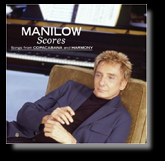 This mini-essay floated through my mind while I was listening to Barry
Manilow's Scores: Songs From Copacabana and Harmony, especially
during the first seven songs, which are culled from Manilow and
lyricist/book writer Barry Sussman's Copacabana. While the songs are
often engaging and occasionally beautiful and/or stirring, as theater songs
they make great pop songs. While the uptempo songs (especially "Bolero de
Amor," which uses Ravel's "Bolero" as an inspiration and the Burt
Bacharach/Hal David sounding "Sweet Heaven (I'm in Love Again)") work better
than the ballads (including "This Can't Be Real," a duet with Olivia
Newton-John), all the numbers from Copacabana come across as generic,
interchangeable pop songs. The songs from Harmony, the
long-time-in-development musical about The Comedian Harmonists, a German
singing group of the '20s and '30s, show promise but still rely on modulation
and dynamics more than lyrics to provide drive and emotional resonance
("Every Single Day" being case in point). Of all the songs, "Look at the
Stars" displays the most promise, although this may be due to the fact that
it was arranged by Jonathan Tunick, rather than one of the myriad of largely
pop-arrangers featured on the rest of the album. This mini-essay floated through my mind while I was listening to Barry
Manilow's Scores: Songs From Copacabana and Harmony, especially
during the first seven songs, which are culled from Manilow and
lyricist/book writer Barry Sussman's Copacabana. While the songs are
often engaging and occasionally beautiful and/or stirring, as theater songs
they make great pop songs. While the uptempo songs (especially "Bolero de
Amor," which uses Ravel's "Bolero" as an inspiration and the Burt
Bacharach/Hal David sounding "Sweet Heaven (I'm in Love Again)") work better
than the ballads (including "This Can't Be Real," a duet with Olivia
Newton-John), all the numbers from Copacabana come across as generic,
interchangeable pop songs. The songs from Harmony, the
long-time-in-development musical about The Comedian Harmonists, a German
singing group of the '20s and '30s, show promise but still rely on modulation
and dynamics more than lyrics to provide drive and emotional resonance
("Every Single Day" being case in point). Of all the songs, "Look at the
Stars" displays the most promise, although this may be due to the fact that
it was arranged by Jonathan Tunick, rather than one of the myriad of largely
pop-arrangers featured on the rest of the album.
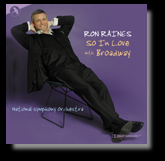 Ron Raines, who performed on Broadway in the 1983 revival of
Showboat and in Teddy and Alice, has released his second solo
album on JAY Records. As you would guess by its title, So In Love with
Broadway
, the album is a collection of songs culled from the stage.
While there are few surprises or unfamiliar tunes, there are thankfully no
horribly overdone warhorses either. Ron Raines, who performed on Broadway in the 1983 revival of
Showboat and in Teddy and Alice, has released his second solo
album on JAY Records. As you would guess by its title, So In Love with
Broadway
, the album is a collection of songs culled from the stage.
While there are few surprises or unfamiliar tunes, there are thankfully no
horribly overdone warhorses either.
Raines has a robust and highly pleasant
baritone that recalls the type of voice heard from Broadway's leading men
before the great tenor invasion of the British Musicals occurred, and it is
perfectly suited for high-octane songs like Kiss Me, Kate's "So in
Love," Brigadoon's "There But For You Go I," and South
Pacific's "Some Enchanted Evening." It is equally effective, however, on
tender numbers like I Do! I Do's "My Cup Runneth Over" (sung with
Karen Ziemba) and The Happy Time's "I Don't Remember You."
Throughout, Raines shows a lyrical sensitivity that is refreshing and
engaging.
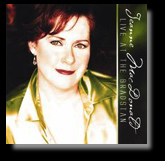 Earlier this year I gave a belated (in that it was released in 2000) rave
to Jeanne MacDonald's debut album, Company [see the original review here]. Since that time, MacDonald, who won both the MAC Award and the Nightlife Award this year for
Best Female Vocalist, has released a second album, Jeanne MacDonald: Live
at the Bradstan. Recorded in June of this year, the CD consists of
standards (such as Irving Berlin's "Blue Skies" and a haunting version of
Mercer/Arlen's "Out of This World" that uses Beethoven's "Moonlight Sonata"
as a springboard), pop songs (Norah Jones' "Come Away with Me," Mary Chapin
Carpenter's "What If We Went to Italy" and a driving "I Say a Little Prayer
for You" by David/Bacharach), lesser-known tunes (the hysterical "Famous
France" by Michael Smith, the best rendition of Rick Jensen's "Amanda Sang"
I have heard, and a beautiful version of Julie Gold's "Goodnight, New York"
that is aching in its simplicity), and even a showtune or two (including a
rollicking rendition of "Big Spender" that shows quite the playful side of
MacDonald). Earlier this year I gave a belated (in that it was released in 2000) rave
to Jeanne MacDonald's debut album, Company [see the original review here]. Since that time, MacDonald, who won both the MAC Award and the Nightlife Award this year for
Best Female Vocalist, has released a second album, Jeanne MacDonald: Live
at the Bradstan. Recorded in June of this year, the CD consists of
standards (such as Irving Berlin's "Blue Skies" and a haunting version of
Mercer/Arlen's "Out of This World" that uses Beethoven's "Moonlight Sonata"
as a springboard), pop songs (Norah Jones' "Come Away with Me," Mary Chapin
Carpenter's "What If We Went to Italy" and a driving "I Say a Little Prayer
for You" by David/Bacharach), lesser-known tunes (the hysterical "Famous
France" by Michael Smith, the best rendition of Rick Jensen's "Amanda Sang"
I have heard, and a beautiful version of Julie Gold's "Goodnight, New York"
that is aching in its simplicity), and even a showtune or two (including a
rollicking rendition of "Big Spender" that shows quite the playful side of
MacDonald).
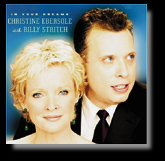 Billy Stritch and Christine Ebersole have released In Your Dreams on the new Ghostlight label,
a jazzy collection of solos and duets that is a studio re-creation of the
show they have been performing across the country. The two, who worked
together on the 42nd Street revival, blend beautifully on numbers
that highlight the lighter, more playful sides of their voices, such as
"You're Getting to Be a Habit with Me," and "Fine and Dandy." Each performer
has moments to shine on solo numbers: Billy with delightful versions of
"We're In The Money" and "Nobody Else But Me," and Christine with a tender
interpretation of "The Folks Who Live On the Hill" and a melancholic
"Lullaby of Broadway." Ebersole does make a couple of missteps, however: a
version of "Can't Help Lovin' That Man" becomes too bombastic (thus
obliterating the heart-rending simplicity that was established earlier), and
her version of "My Ship" is more than a tad head-scratching due to her
attempts to mimic a horn section. Billy Stritch and Christine Ebersole have released In Your Dreams on the new Ghostlight label,
a jazzy collection of solos and duets that is a studio re-creation of the
show they have been performing across the country. The two, who worked
together on the 42nd Street revival, blend beautifully on numbers
that highlight the lighter, more playful sides of their voices, such as
"You're Getting to Be a Habit with Me," and "Fine and Dandy." Each performer
has moments to shine on solo numbers: Billy with delightful versions of
"We're In The Money" and "Nobody Else But Me," and Christine with a tender
interpretation of "The Folks Who Live On the Hill" and a melancholic
"Lullaby of Broadway." Ebersole does make a couple of missteps, however: a
version of "Can't Help Lovin' That Man" becomes too bombastic (thus
obliterating the heart-rending simplicity that was established earlier), and
her version of "My Ship" is more than a tad head-scratching due to her
attempts to mimic a horn section.
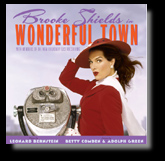 In what might just be a musical theater first, two cast albums have been
released in a single year of the same production. In March of this year, a
cast album of the current revival of Wonderful Town was released
starring Donna Murphy. This month, a new cast recording of the same show was
released featuring the show's current leading lady, Brooke Shields. The
album is essentially the same recording as the 'original,' in that it uses
the same vocal tracks for everybody except Shields and the show's current
Eileen, Jennifer Hope Wills, both of whom have been edited into group
numbers and laid new vocal tracks over the preexisting orchestra tracks for
solos. Thus, one's enjoyment of this album versus the previous one will rely
on one's preference of Shields versus Murphy, or Wills versus Jennifer
Westfeldt. In the first celebrity death match, it is a hard call. Murphy is
the better singer and performer, but her take on the part of Ruth Sherwood
gives her a strong, hard edge and a sometimes overwhelming intelligence,
making the character almost unapproachable. Shields gives the part a great
deal of warmth and seems more amused by her situation rather than angry at
the world. In the second pairing, Wills versus Westfeldt, my money is on
Wills hands down, as she displays a great deal more vocal warmth and a great
deal less vibrato than her predecessor. In what might just be a musical theater first, two cast albums have been
released in a single year of the same production. In March of this year, a
cast album of the current revival of Wonderful Town was released
starring Donna Murphy. This month, a new cast recording of the same show was
released featuring the show's current leading lady, Brooke Shields. The
album is essentially the same recording as the 'original,' in that it uses
the same vocal tracks for everybody except Shields and the show's current
Eileen, Jennifer Hope Wills, both of whom have been edited into group
numbers and laid new vocal tracks over the preexisting orchestra tracks for
solos. Thus, one's enjoyment of this album versus the previous one will rely
on one's preference of Shields versus Murphy, or Wills versus Jennifer
Westfeldt. In the first celebrity death match, it is a hard call. Murphy is
the better singer and performer, but her take on the part of Ruth Sherwood
gives her a strong, hard edge and a sometimes overwhelming intelligence,
making the character almost unapproachable. Shields gives the part a great
deal of warmth and seems more amused by her situation rather than angry at
the world. In the second pairing, Wills versus Westfeldt, my money is on
Wills hands down, as she displays a great deal more vocal warmth and a great
deal less vibrato than her predecessor.
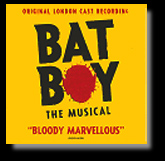 The Off-Broadway cult hit, Bat Boy: The Musical, which remains one
of my favorite recordings in that musical vein, was recently produced (and recorded) in
London. The show, which is still running, features the original Bat Boy wonder, Deven May, and three new
three songs. For the scene in which the Bat Boy arrives at his new home, "Hey
Freak" combines elements of "Ugly Boy" and "What You Wanna Do" to create a
whole new (and greatly improved) number. In the second act, the post-coital
number, "Inside Your Heart," has been replaced by "Mine All Mine," which gives
the character of Shelley more dramatic power and thrust. The London CD also
contains the 'prologue' in which the Bat Boy is discovered, "Dude, What Is
It?," and the 'kill the beast' scene, "More Blood/Kill the Bat Boy!" plus
additional scene elements sprinkled throughout the score (including almost a
minute of material added to the opening number, "Hold Me, Bat Boy"). The Off-Broadway cult hit, Bat Boy: The Musical, which remains one
of my favorite recordings in that musical vein, was recently produced (and recorded) in
London. The show, which is still running, features the original Bat Boy wonder, Deven May, and three new
three songs. For the scene in which the Bat Boy arrives at his new home, "Hey
Freak" combines elements of "Ugly Boy" and "What You Wanna Do" to create a
whole new (and greatly improved) number. In the second act, the post-coital
number, "Inside Your Heart," has been replaced by "Mine All Mine," which gives
the character of Shelley more dramatic power and thrust. The London CD also
contains the 'prologue' in which the Bat Boy is discovered, "Dude, What Is
It?," and the 'kill the beast' scene, "More Blood/Kill the Bat Boy!" plus
additional scene elements sprinkled throughout the score (including almost a
minute of material added to the opening number, "Hold Me, Bat Boy").
While
the performances may not be as strong overall as the Off-Broadway version
(but let's face it: Kerry Butler as Shelley and Kaitlin Hopkins as her
mother, Meredith, are tough acts to match, much less beat), this is an
exceptionally strong recording (and the diction is vastly improved in many
cases, making the lyrics easier to understand).
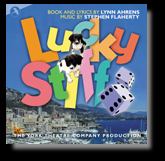 JAY Records has released what is essentially the first cast album of Lynn
Ahrens and Stephen Flaherty's first musical: Lucky Stiff. While the
show was recorded in 1993, it was a studio recording and did not feature all
of the original members from the 1988 Off-Broadway cast (it featured
three: Paul Kandel, Barbara Rosenblat and Mary Testa, all three of whom also
appear on the new JAY recording). The new recording preserves the
recent York Theatre bare-bones Musicals in Mufti production and also features
two other people who appeared in the Off-Broadway production in 1988: Stuart
Zagnit and Ron Faber. Based on The Man Who Broke the Bank at Monte Carlo,
Lucky Stiff by Michael Butterworth, Lucky Stiff is a farce filled
with dead bodies, missing diamonds, mistaken identities, stalkers and dogs. JAY Records has released what is essentially the first cast album of Lynn
Ahrens and Stephen Flaherty's first musical: Lucky Stiff. While the
show was recorded in 1993, it was a studio recording and did not feature all
of the original members from the 1988 Off-Broadway cast (it featured
three: Paul Kandel, Barbara Rosenblat and Mary Testa, all three of whom also
appear on the new JAY recording). The new recording preserves the
recent York Theatre bare-bones Musicals in Mufti production and also features
two other people who appeared in the Off-Broadway production in 1988: Stuart
Zagnit and Ron Faber. Based on The Man Who Broke the Bank at Monte Carlo,
Lucky Stiff by Michael Butterworth, Lucky Stiff is a farce filled
with dead bodies, missing diamonds, mistaken identities, stalkers and dogs.
Musically, the show displays a foretaste of the feasts that Ahrens and
Flaherty would create in more fully formed shows like Once On This
Island and Ragtime. The opening number, "Something Funny's Going
On," recalls Forum's "Comedy Tonight" in the best way. "The Phone
Call," a mini-playlet in which a character tries to tell his wife that he
has been marked for extermination, is a comic gem. And "Times Like This," a
beautiful ballad extolling canine companionship, has achieved a moderate
life in the cabaret circuit.
The new recording contains material not included on the original
recording. The first act's finale has been added, plus "A Woman in My
Bathroom" and a slightly re-written version of the reprise of "Nice" (a
portion of which was included in "Confession II" on the original disc). Some additional spoken lines are also included (although lines that were included in the original version, including,
inexplicably, Uncle Tony's "Last Request," have been cut). The disc also includes the cut
song "Shoes" (which has been also recorded by Alix Korey on Gifts of
Love). Given all the additional material, why does the album feel,
well, superfluous and not nearly as 'must-have' as the original? Part of it
is due to the fact that, musically, the disc sounds thin as it is accompanied
by a piano versus the five-person band heard on the 1993 version. Mainly,
however, it is due to the cast. Since three performances appear on both
discs, there is a feeling of aural deja vu. And, to be honest, the new
performers on the new recording aren't as strong as the 'originals,' which
included Jason Graae, Judy Blazer, Debbie Shapiro Gravitte and Mary Testa:
all hard acts to beat. While a lot of griping has occurred over the accent
Evan Pappas used while playing the hapless British shoe salesman Harry
Witherspoon, his 'replacement,' Malcolm Gets, has an even more erratic and
geographically wandering accent. Overall, I would recommend getting the far
superior original 1993 recording, which is still in print.
Next up will be my Best of 2004 lists.
-- Jonathan Frank
Make sure to check our list of Upcoming Releases.
|
|

